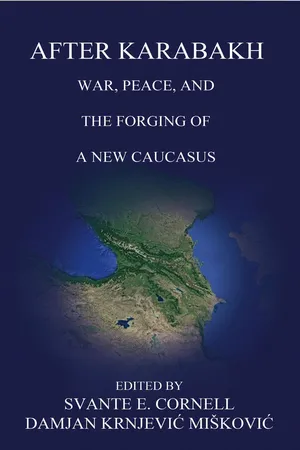
After Karabakh
War, Peace, and the Forging of a New Caucasus
- English
- ePUB (mobile friendly)
- Available on iOS & Android
About this book
The outcome of the Second Karabakh War is a watershed event in the modern history of Eurasia. It represents the moment of conception of a new South Caucasus, the only part of the world that borders on Russia, Turkey, and Iran. Unsurprisingly, external powers like the U.S., China, the EU, India, and the GCC states are all taking greater interest in its future. Written for scholars and designed for classroom use, AFTER KARABAKH: War, Peace, and the Forging of a New Caucasus is the go-to book for anyone trying to make sense of the geopolitics of this often-misunderstood conflict. As the editors argue in their Introduction, the end of the conflict over Karabakh "will serve as a catalyst for the instauration of a much-anticipated peace dividend centered on optimizing the region's strategic connectivity potential."
As Michael Doran writes in the Foreword, AFTER KARABAKH "performs a great service to students of international politics. We now have in one volume a set of comprehensive analyses of the main dimensions of the Second Karabakh War. By producing sharp, judicious, and readable accounts, the authors, who are all internationally recognized experts in their fields, have ensured that this volume will become the standard account of the conflict."
Editors
Svante E. Cornel l is Research Director of the American Foreign Policy Council's Central Asia-Caucasus Institute and a co-founder of the Institute for Security and Development Policy (ISDP).
Damjan Krnjevi? Miškovi? is Professor of Practice at ADA University, where he serves concurrently as Director for Policy Research, Analysis, and Publications at the Institute for Development and Diplomacy and Co-Editor of Baku Dialogues.
Contributors
Robert M. Cutler, NATO Association of Canada and University of Waterloo Institute for Complexity and Innovation.
Michael Doran, Hudson Institute.
Nikolas K. Gvosdev, U.S. Naval War College and Foreign Policy Research Institute.
Fariz Ismailzade, ADA University.
Onnik James Krikorian, Tbilisi-based journalist and photojournalist.
Niklas Nilsson, Swedish Defence University.
Frequently asked questions
- Essential is ideal for learners and professionals who enjoy exploring a wide range of subjects. Access the Essential Library with 800,000+ trusted titles and best-sellers across business, personal growth, and the humanities. Includes unlimited reading time and Standard Read Aloud voice.
- Complete: Perfect for advanced learners and researchers needing full, unrestricted access. Unlock 1.4M+ books across hundreds of subjects, including academic and specialized titles. The Complete Plan also includes advanced features like Premium Read Aloud and Research Assistant.
Please note we cannot support devices running on iOS 13 and Android 7 or earlier. Learn more about using the app.
Information
Table of contents
- Foreword
- Introduction
- The Geopolitics of the Caucasus and the Road to War
- Perfect Timing and Statecraft
- The Foreign and Security Policies of Armenia and Azerbaijan, 1994--2020
- The Evolving Role of the West in the Armenia--Azerbaijan Conflict
- Sitting on Two Chairs
- Gradually, then Suddenly
- Iran’s Role in the Armenia--Azerbaijan Conflict
- Armenia’s Pashinyan Conundrum
- No More War, Not Yet Peace
- Military Lessons from the Second Karabakh War
- The Geopolitical Causes and Consequences of the Second Karabakh War
- About the Contributors